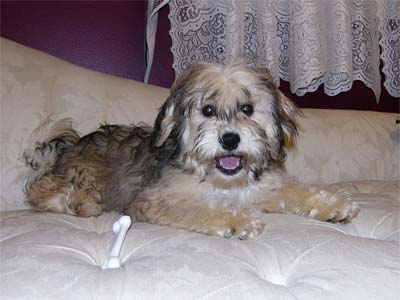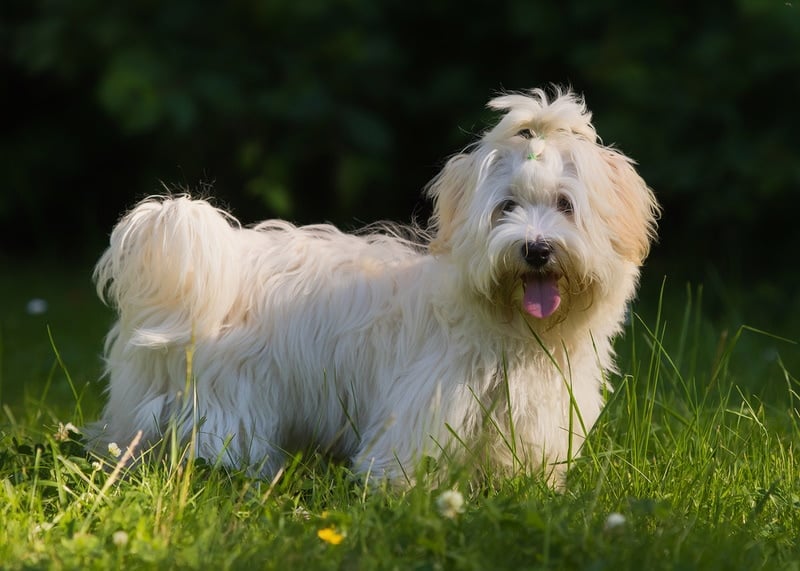
Though the Havanese is a toy dog, this companion dog has a sturdy build for its size!
The Havanese are one of the Bichon breeds and were developed in Cuba. Also known as the Havanese Silk Dog, they have a long. wavy to curly soft coat. They were a favorite of the upper class. but when many Cubans fled to the United States they had to leave their Havanese dogs behind. This lead to the near demise of the breed. It was with a strong American interest in the 1970’s, and only 11 dogs in the country, that dedicated breeders were able to bring these dogs back from the edge of extinction to become one of the fastest growing breeds. There is a common variation in the breed that is known as the Shavanese, and it has a short smooth coat rather than the long wavy coat of the Havanese dog.
Havanese make wonderful companions for individuals and families. They are loving, playful, and obedient. They will get along with just about everyone and all other pets, though strangers will need to be established as welcome in your home for them to warm up to them. They are very intelligent and train easily. Most do not bark excessively, but they do make good watchdogs. This breed makes a wonderful apartment dog.
When selecting a Havanese, one of the primary concerns is eye problems. The breed is prone to several of them. Luxating patellas are also fairly common in the Havanese.
- Kingdom: Animalia
- Phylum: Chordata
- Class: Mammalia
- Order: Carnivora
- Family: Canidae
- Genus: Canis
- Species: lupus familiaris
Common Name(s)
Havanese, Havana Silk Dog, Bichon Havanais, and Havanese Cuban Bichon
Breed Type
The Havanese is a toy breed. Although the Havanese has always been a companion breed, it has a sturdy build for its size.
Background
The Havanese is one of the Bichon breeds. Developed in Cuba, it was once a favorite of the upper class of the country. Its popularity waned during the Cuban Revolution, when many Cubans fled to the United States and were unable to bring their dogs along. Numbers dwindled due to a sharp decrease in breeding.
Americans gained interest in the Havanese in the 1970s, but there were only 11 of the breed in the country. But more dogs were brought in from other countries, and the breed began to make a comeback. Today it is one of the fastest growing breeds according to AKC registration.
A fairly common variation in the breed is known as the Shavanese. These dogs are born with short, smooth coats due to the inheritance of two recessive genes. This is considered a fault, and these dogs may not be shown.
Description
The Havanese is a small dog with a sturdy build and rugged look. Its eyes are almond shaped and usually black, and its ears hang down at medium length. The tail is long and curves over the back. The coat of the Havanese is long, silky, and wavy or curly. All colors are acceptable for showing. Chocolate Havanese differ from the other colors in that they have green or amber eyes and a brown nose and lips.
Havanese are 8 to 11 inches tall and weigh 7 to 13 pounds.
Care and Feeding
Havanese are prone to digestive difficulties, so it is important to monitor their diets carefully. The diet should include 20 to 30 percent fat, as well as adequate amounts of fruits, vegetables and carbohydrates.
Pet Havanese are often clipped short to make grooming easier. If the coat is kept long, it must be brushed and combed regularly to remove mats and dead hair. The feet will need to be trimmed periodically. Nails should be clipped as needed, and teeth brushed once a week. Havanese are generally healthy dogs, but they need annual checkups to maintain their good health.
Vaccinations for Havanese dogs are due on the following schedule:
- 6-8 weeks: Distemper, Leptospirosis, Hepatitis, Parainfluenza, Parvo, and Corona virus (DHLPPC)
- 10-12 weeks: Second DHLPPC
- 14-16 weeks: Third DHLPPC and rabies
- Annually: DHLPPC and rabies booster
In general, Havanese Silk Dogs do not shed, making them a good breed for allergy sufferers. However the short-haired Havanese, the Shavanese, do shed some hair. Regular vacuuming should be adequate.
Housing Your Dog
Havanese are best suited to indoor life. They can thrive in small spaces as long as they get enough exercise.
Social Behaviors
The delightful Havanese has a way of getting along with everyone. It is great with children and other dogs. It also does well with strangers once it is established that they are welcome in your home.
Handling and Training
Havanese are easy to train for obedience, and they excel at doing tricks. They are sensitive dogs, so it is important to use positive reinforcement for best results.
Activities
The Havanese needs a daily walk to keep him happy and healthy. This playful breed enjoys the opportunity to run off-leash, but does not need frequent strenuous exercise.
Breeding/Reproduction
Litter size may be up to nine puppies. When choosing a mate for your Havanese, check bloodlines for eye problems and luxating patellas.
Common Health Problems
Eye problems common to the Havanese include progressive retinal atrophy, retinal dysplasia, and cataracts. These ailments may require medical treatment, possibly including surgery. Other health problems that may be bothersome in the breed include luxating patella and dry skin.
Availability
Havanese are reasonably easy to find. Breeders may be located online if you can’t find one in your local area. Prices are often over $1,000.
References
- Animal-World References: Dog Breeds
- “Havanese”, Dog Breed Info Center, Copyright 1998-2008
- “Havanese”, Wikipedia, Copyright 2008
- Kelly, Fiona, “A Healthy Diet for Your Havanese”, Havanese-Puppy-Guide, Copyright 2005, 2006
- “Feeding Your Havanese Puppy”, Copyright Havanese Club of America, Referenced online, 2008
http://www.havanese.org/Education/newOwnerEdFeeding.htm - “Havanese Puppies for Sale”, Copyright PuppyFind.com, LLC, Referenced online, 2008
Featured Image Credit: Sandra Huber, Shutterstock
